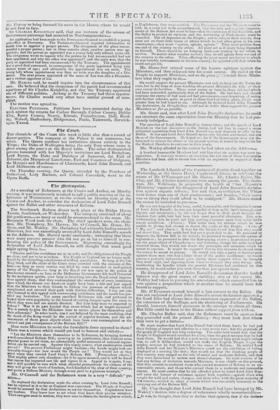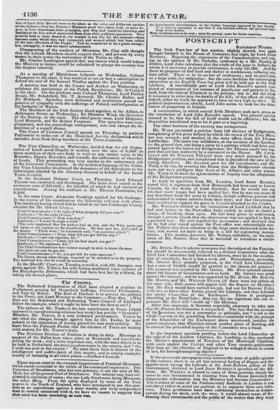The Lambeth Liberals of the Camberwell district dined together on
Wednesday, at the Grove Hotel, ('amberwell Grove, to celehrate the return of Mr. D'Eyncourt and Mr. Mantes. Mr. Charles Buller, Mr. Clay, and Mr. Charles Lushington were among the guests. The chair- man, Mr. Wilkinson, in proposing the health of " her Majesty's Ministers," expressed his disapproval of Lord John Russell's declara- tion against organic reform ; but said that, nevertheless; the Whigs were better than any of their predecessors ; and besides, " their cause was so strong they could afford to be indulgent." Mr. Hawes stated the course he intended to pursue— He was not forgetful of the long, useful, honourable, and distinguished career of Lord John Russell; he was nut forgetful of that noble lord's triumph over bigotry and intolerance ; he did not foiget that in their great strugele for freedom that noble lord had been their most powerful champion. But, not- withstanding this, he could not help passing a censure upon that noble lord's recent exhibition. (Cheers.) That noble Mid, for reasons which lie was unable to divine, had choseu to desert the ranks of the People. 1 Cries of "No, no I " and cheers.) It was for the People to tell him that they wouU not desert him. Tbat noble lord had yet a great deal to do. He promised to improve the Reform Bill in its details; he promised to improve the system of registration ; he promised to alter the Rate-paying clause ; he promised to pur- sue the great object of Church-rates; and therefore, though the noble lord had deserted them, they would not desert the principles and measures which he meant to espouse. It might be expected that out this occasion he should state the course he meant to pursue. Ile would not take a party or factious part against those men who had a large share of the public confidence : he would pursue a perfectly independent part, arising them support when he thought they were right, and opposing them when lie thought they were wrong : and, recollecting the benefits which the present Ministers haul conferred on this country, lie would rather join with them thou juin against them.
He disapproved of Lord .Tolin Russell's declaration that the landed interest was the great source of stability ; also of the course Mr. Wakley had taken in pressing his amendment, which compelled him to vote against a proposition which at another time he should have felt bound to support.
Mr. D'Eyncourt avowed himself a late convert to the Ballot. He was not surprised at Lord John Russell's recent declaration against it ; for Lord John had always been the consistent opponent of the Ballot, the extension of the Suffrage, and the shortening of Parliaments. He should, however, himself persevere in the attempt to obtain all three.
But little could be done in the House without support front without.
Mr. Charles Buller said, that the Reformers must be cautious how they quarrelled with the present Ministry: they must look first when they were to get a better— He must confess that Lord John Russell bad tried them hard ; he had put their feelings of respect and affection to a very severe test; but the gratitude of
the people of England was long enduring. The noble lord would timid that the People of England would recollect for a long time the great set vices that he had done them. He would find that a rash word, however false pride might induce
him to call it deliberation, would not make the English People feeget the mighty services he had rendered to the cause of Reform. He wished Lord John Russell and her Majesty's Ministers could see the exhibition of feeling
displayed at a meeting like that ; they would see that the thinking people of
this country were ranged on the side of useful and moderate Reform, and that they were disinclined to useless end abetted change.. Ile roust confess, if he had any feeling of irritation towards Ministers, it was chiefly on this ground, that they seemed to confound those who carried measures of Reform to an un- reasonable extent, and those who carried them to a moderate and reasonable
extent. Ile must confess that he felt offended when he found Lord John Rus- sell raise the banner of resistance against both together—against those who sought for wild and useless changes, and those who, with the great majority of the country, wished to adopt a course which was essentially necessary to the carrying out of the Reform Bill.
Mr. Clay thought that Lord John Russell had been betrayed by Mr. Wakley's motion into a degree of vehemence wholly unwarrantable- - It was, he thought, their duty to declare their opinion, that if the declara• time of Lord John thoseIt were to be taken as the calm rind deliberate opinion of alit.Colibiet, then her Alsjsaity's Ministers must have been -held, in some de- /free, to have abandoned dheir principles, and. they had rendered shadowy and Stedistinet the brie which separated then from their political opponents. They must be held to have deserted—he owned it was but for the moment—those banners under which they had conquered, and around which had been rallied all the beet affections of the People. This be considered to be a grave charge ; but, unhappily, it was too easily substantiated.
Disapproving of the conduct of Ministers, Mr. Clay still thought that the Liberal Members should support them ; and prevent by every means in their power the restoration of the Tories to office.
Mr. Charles Lushington agreed that any course which would induce the Ministry to resign, would be calculated to plunge the country into the deepest calamity.



























 Previous page
Previous page